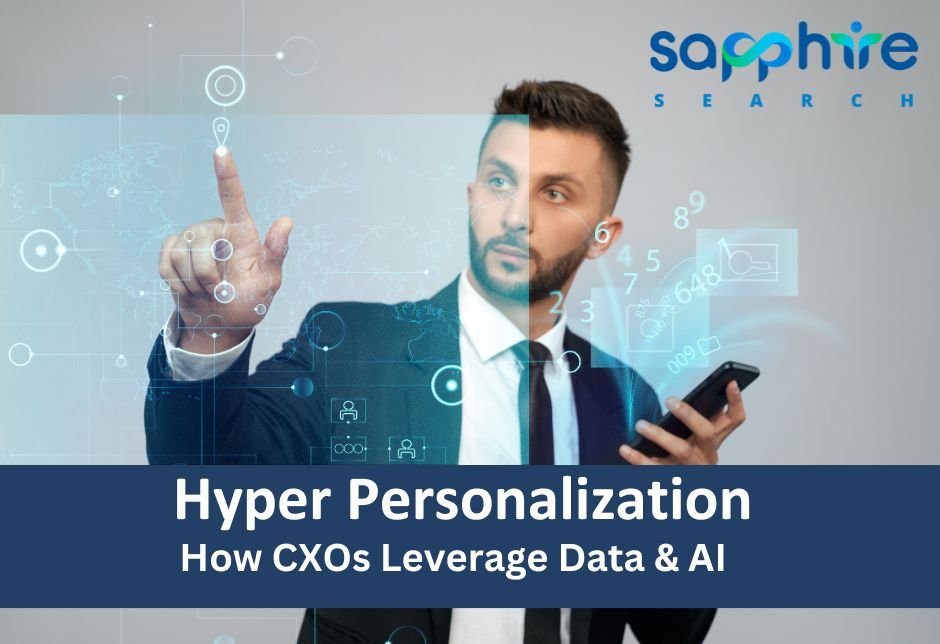
.Clients and customers expect a personalized experience during their interaction process. Hyper personalization takes this a step further, leveraging data and AI to create custom interactions for individual customers. It is the next evolution in personalization, going beyond traditional segmentation-based personalization. It aims to achieve "strategic individualization" by combining customer data and AI to generate real-time, individualized insights. This approach enables companies to tailor experiences for individual customers based on their unique behaviors and preferences, enhancing customer satisfaction, retention and revenue.
The foundation of hyper personalization is data. By collecting customer information from various sources like purchase history, browsing behavior and social media interactions, CXOs can gain a 360-degree view of their customers.
Once data is collected, AI and machine learning come into play. These powerful tools analyze customer data to identify patterns, predict preferences and anticipate future needs.
Armed with customer insights, CXOs can craft highly targeted experiences. This might involve personalized product recommendations, tailored marketing messages, or customized customer service interactions.
Hyper personalization isn't just about boosting sales. It can improve customer satisfaction, increase brand loyalty and reduce churn. By understanding and catering to individual needs, CXOs can create a more meaningful customer experience.Data is the new oil for CXOs, empowering them to derive actionable insights, unravel market obscurity and make informed decisions that drive growth. By harnessing data laden with insights, companies can outmaneuver their competition and bolster their own business performance. Advanced analytics capabilities can process large volumes of data swiftly to deliver meaningful insights, making it accessible to even smaller players.
Data-driven success stories are a testament to the transformative power of data in modern business. These stories highlight how companies have leveraged data to drive growth, innovation and competitiveness. Here are some key case studies that illustrate the impact of data-driven strategies:
Amazon's success is built on its ability to collect and analyze vast amounts of customer data. By using this data to personalize product recommendations, Amazon has created a seamless shopping experience that keeps customers coming back. This data-driven approach has enabled Amazon to stay ahead of the competition and maintain its position as a leader in e-commerce.
Netflix uses data to inform its content creation strategy. By analyzing user preferences and viewing habits, Netflix can predict which shows and movies will be popular and invest in those areas. This data-driven approach has allowed Netflix to create a diverse and engaging content library that appeals to a wide range of audiences.
Spotify uses data to create personalized music recommendations for its users. By analyzing user listening habits and preferences, Spotify can suggest new music that users are likely to enjoy. This data-driven approach has helped Spotify build a loyal user base and stay ahead of the competition in the music streaming market
Airbnb uses data to optimize its hospitality services. By analyzing user reviews and preferences, Airbnb can improve the quality of its listings and provide a better experience for its users. This data-driven approach has helped Airbnb build a reputation for providing high-quality accommodations and stay ahead of the competition in the sharing economy
No Broker uses data to provide accurate and up-to-date information about real estate listings. By analyzing market trends and user preferences, Zillow can help users find the right properties and stay ahead of the competition in the real estate market
To successfully implement hyper personalization strategies, businesses should begin with a customer journey mapping initiative. CX teams must assess touchpoints and identify opportunities for hyper personalization, considering potential data sources that can bolster these initiatives. For example, a customer browsing a company's website can be analyzed through various data points, such as time spent on search, purchase history and seasonality, to deliver personalized recommendations or discounts.Hyper personalization strategies rely heavily on customer data, raising questions about data privacy and consent. Companies must ensure they can ethically collect and use data while respecting compliance regulations. Hyper personalization initiatives must remain unintrusive, engaging users' attention without revealing complex analytical processes, to maintain positive customer relationships and avoid crossing the "creepy line."
Hyper personalization represents the future of customer experience, offering significant benefits in terms of customer satisfaction, retention and revenue. By combining customer data and AI, companies can deliver individualized insights and tailored experiences. CXOs who ignore data at their peril must adopt a data-centric approach to harness the power of hyper personalization and drive business success.
With Sapphire, discover visionary leaders who elevate your organization to its fullest potential.
Contact us today to schedule a consultation with one of our expert consultants. We'll help you identify opportunities for growth and improvement.
Whether you’re looking for top leadership, market insights, or updates on exclusive events, share your query with us.
We are India’s most agile executive search and leadership advisory firm, with over 1,500 leadership closures across industries. We’ve placed more than 50 CEOs and 40+ Partners in top consulting firms, establishing a proven record of impact.
From building entire leadership teams for financial services houses to closing rare mandates like Chief Data Scientist for a US tech firm’s India R&D centre, we have deep expertise in BFSI, Technology & Consulting, Industrials, Infrastructure, Healthcare, Consumer, and Retail.
We executed India’s largest team movement by a search firm (65+ leaders in one transaction) and facilitated the highest-value leadership hiring deal in India.
Our Founder & CEO, Ankit Bansal, is a serial HR entrepreneur with prior experience at McKinsey, PwC, and Standard Chartered. He also co-founded one of India’s largest flexi-job platforms and is an Advisory Board member of the India Diversity Forum.
Schedule a free 30-minute discovery call with one of our consultants to discuss your specific needs and how we can help transform your business.
Book a Discovery Call
Whether you’re looking for top leadership, market insights, or updates on exclusive events, share your query with us.